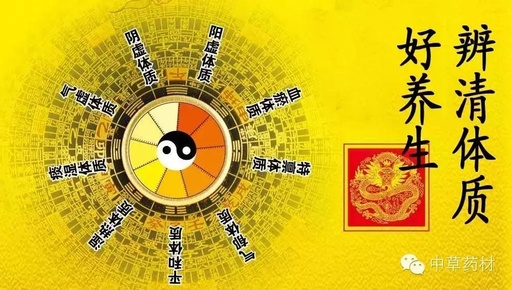The study of body constitution in Traditional Chinese Medicine (TCM) primarily determines the differences in individual constitutions within populations based on fundamental theories such as Yin-Yang, the Five Elements, Zang-Fu organs, and the essence, Qi, blood, and body fluids. The specific classification methods include Yin-Yang classification, Five Elements classification, Zang-Fu classification, body shape classification (fat and thin), and temperament classification (brave and timid).
1. Methods of Body Constitution Classification
TCM uses the theory of Yin-Yang to explain the laws of life movement, addressing issues of health and disease. Therefore, TCM primarily classifies body constitution based on physiological functional characteristics using the Yin-Yang theory. This section adopts the Yin-Yang classification method for body constitution. It should be noted that the terms used in body constitution classification, such as Yin deficiency (Yin xu), Yang deficiency (Yang xu), Yang hyperactivity (Yang kang), phlegm-fluid (Tan Yin), spleen deficiency (Pi xu), and liver excess (Gan wang), are different concepts from the syndrome names used in syndrome differentiation and treatment. They reflect individual specificity that exists even in a non-disease state.
2. Normal Constitution
“Yin and Yang are balanced, called a person,” and “When Yin is balanced and Yang is secret, the spirit is treated.” Therefore, the ideal constitution should be one of balanced Yin and Yang. However, the balance of Yin and Yang is a dynamic equilibrium of their growth and decline, so there is always a state of relative Yin or Yang. As long as it does not exceed the body’s regulatory and adaptive capacity, it is considered a normal physiological state. Thus, the normal body constitution can be roughly divided into three types: balanced Yin-Yang constitution, Yang predominant constitution, and Yin predominant constitution.
(1) Balanced Yin-Yang Constitution
The balanced Yin-Yang constitution is characterized by relatively coordinated functions. Individuals with this constitution are strong, with a moderate body size; they may be slightly overweight but not sluggish, or slightly thin but energetic. Their complexion and skin tone may show a bias towards the five colors, but they are all bright and subtle, with spirited eyes, a gentle and cheerful personality, moderate appetite, smooth bowel movements, and strong self-regulation and adaptability. Those with a balanced Yin-Yang constitution are not easily affected by external pathogens, rarely fall ill, and if they do, they often recover spontaneously or are easily cured. They have abundant energy, high work potential, sleep soundly at night, and rest efficiently. If they maintain proper postnatal nourishment without violent injuries or chronic diseases, their constitution is not easily altered, and they are likely to achieve longevity.
(2) Yang Predominant Constitution
The Yang predominant constitution refers to a constitution characterized by hyperactivity, heat, and restlessness. Individuals with a Yang predominant constitution are often slightly thin but relatively fit. Their complexion tends to be slightly red or slightly dark, or they may have oily skin; they are extroverted, active, easily irritable, and have poor self-control; their appetite is larger, and their digestive absorption function is robust. Those with a Yang predominant constitution tend to be sensitive to heat, prefer coolness, may have slightly elevated body temperature, sweat easily when active, and have a strong desire for water; they are energetic, quick in movement, and responsive, with a strong sexual drive.
Individuals with a Yang predominant constitution are more susceptible to wind, heat, and summer heat pathogens. After being affected, they often present with heat syndrome and excess syndrome, leading to dryness and Yin injury. Their skin is prone to boils and sores. Internally, they often exhibit symptoms of excessive fire, Yang hyperactivity, or combined Yin deficiency, leading to dizziness, headaches, palpitations, insomnia, and bleeding.
Such individuals have excessive Yang energy, are hyperactive, and have little rest, which consumes Yin energy. Coupled with excessive labor, unregulated thoughts, and indulgence, this will accelerate Yin injury and evolve into common pathological constitutions such as Yang hyperactivity, Yin deficiency, and phlegm-heat.
(3) Yin Predominant Constitution
The Yin predominant constitution refers to a constitution characterized by insufficient Yang, coldness, and inactivity. Individuals with this constitution are often slightly overweight but weak and easily fatigued; their complexion tends to be pale and lacks luster; they are introverted, prefer quietness, and may be timid and easily startled; their appetite is smaller, and their digestive absorption function is average; they tend to be sensitive to cold, prefer warmth, or have slightly lower body temperature. Their energy is relatively weak, movements are slow, and reactions are sluggish.
Individuals with a Yin predominant constitution are more susceptible to cold and damp pathogens. After being affected, they often manifest cold symptoms, with no fever or low-grade fever, and are prone to internal transmission or direct invasion of the internal organs. They are prone to frostbite in winter. Internally, they often exhibit symptoms of excessive Yin and Yang deficiency. They are susceptible to conditions such as damp stagnation, edema, phlegm-fluid, and blood stasis. Individuals with this constitution have weak Yang energy, which can lead to insufficient Yang energy, weakened organ functions, and internal generation of dampness, resulting in common pathological constitutions such as Yang deficiency, phlegm-dampness, and phlegm-fluid.
Postscript:
The platform shares daily content related to TCM health preservation, Chinese herbal materials, and more, returning to simplicity and harmony with nature. Thank you for your attention!
If you have good TCM cultural content or excellent TCM formulas, please contact the platform.
If you have symptoms of illness or related questions, feel free to leave a message for discussion.
Follow me
Chinese Herbal Materials:zcyc99
Farm Products: zghaotc
WeChat: 13636555223, 13560798200, 15989377558

